
The novel begins with a savage and seemingly random act of violence in a pub car park. Of course, in crime novels such acts are never really random, but the author plays her cards cleverly and much later in the book we learn of its significance. DC Goodhew is an intriguing character, and the author chooses ‘show’ rather than ‘tell’ in her technique. We have very little in the way of direct description of Goodhew. Instead, we learn about him by how he reacts to events.
An American student is found dead in her room after falling out with her housemates. One of them is Matt Stone, still unable to come to terms with the death of his mother from cancer. His best friend, Libby Brett, has also moved into the house to escape the abusive relationship between her mother and father, which has worsened since the deaths of two older siblings. As more deaths occur, Goodhew, enigmatic but intuitive and compassionate, won’t leave things alone despite the instructions of his boss, DI Marks. He senses that there is a thread which links the past and the present, but the solution remains tantalisingly out of reach.
Goodhew attempts to bring the truth to the surface by drawing a complex map on a bare wall in his house, showing all the people he believes are involved in the case. The nub of the plot is how the actions of one generation can reach down the years to affect the next. Occasionally, as the author introduces individuals into the narrative, I felt I needed to draw a similar map, just to keep track of the complexities. As the drama intensified, however, the picture became much clearer. The great strength of the book is the incisive portrayal of the Brett and Stone families. They are far from breakfast advert material, but we recognise them, and share their struggles to keep their heads above water.
DC Goodhew’s search for the truth is refreshingly free of pointlessly complex descriptions of how the crime scene is handled. We are trusted to assume that the police know their business and will do their job without it having to be itemised for us. All the characters are sympathetically described, and the author is particularly skilful in evoking our compassion, even for those whose behaviour causes pain and discomfort to themselves and those around them. Purely in terms of crimes being solved and criminals being brought to justice, DC Goodhew does the job, but he shows little pleasure at the final outcome, and I shared his sense of melancholy at the end of the book, as those whose lives have been changed forever by misdeeds from the past try to come to terms with the future.
This book was recommended by our guest columnist Miles, and you can read his comments here.
Constable & Robinson
Print/Kindle
£6.86
CFL Rating: 5 Stars